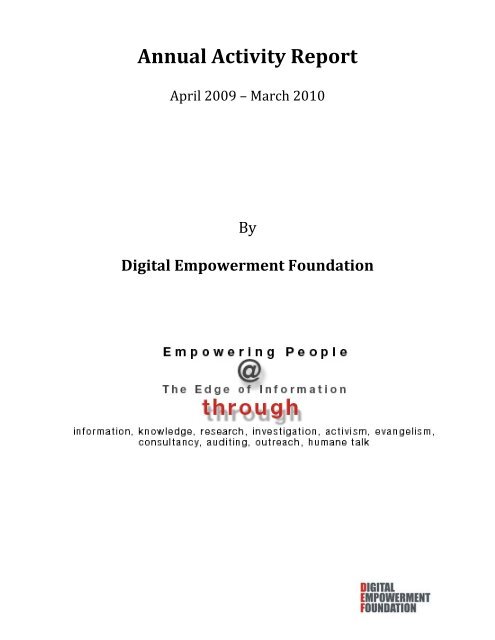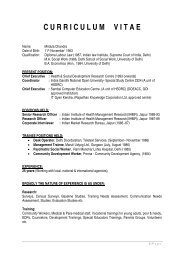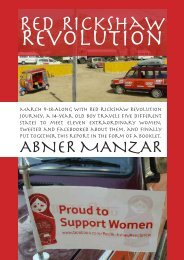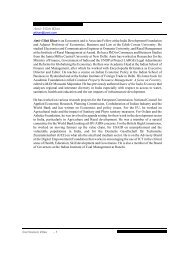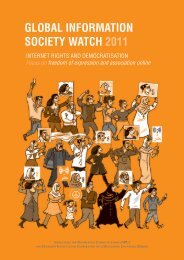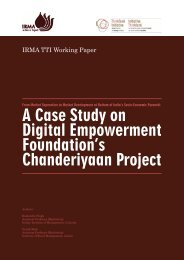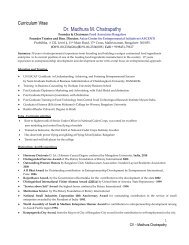Ann ort ual Activity Rep - Digital Empowerment Foundation
Ann ort ual Activity Rep - Digital Empowerment Foundation
Ann ort ual Activity Rep - Digital Empowerment Foundation
You also want an ePaper? Increase the reach of your titles
YUMPU automatically turns print PDFs into web optimized ePapers that Google loves.
<strong>Ann</strong><strong>ual</strong> <strong>Activity</strong> <strong>Rep</strong><strong>ort</strong>April 2009 – March 2010By<strong>Digital</strong> <strong>Empowerment</strong> <strong>Foundation</strong>
ABOUT DIGITAL EMPOWERMENT FOUNDATION (DEF)<strong>Digital</strong> <strong>Empowerment</strong> <strong>Foundation</strong>, a Delhi based not‐for‐profit organization,registered under Societies Act XXI of 1860 in 2002, working at grassroots of India tocreate economic and commercial viability using means of Information,Communication and Technology (ICT).Since its inception in December 2002, <strong>Digital</strong> <strong>Empowerment</strong> <strong>Foundation</strong> (DEF) hasengaged itself into number of activities while pursuing its mission and objectives ofICT delivery and promotion in India. One of its focus areas of intervention had beendevelopment, promotion, spread and usage of content for grassroots use andconsumption.ACTIVITY PROGRAMMES 2009 2010Following are some of the major activities of <strong>Digital</strong> <strong>Empowerment</strong> <strong>Foundation</strong> inthe year 2009 – 2010:<strong>Digital</strong> Panchayat Programme (www.epanchayat.in)<strong>Digital</strong> <strong>Empowerment</strong> <strong>Foundation</strong> (DEF) initiated the project in 2008 in order toempower the bottom‐most governance unit of the governance body and alsoempower rural and grassroot levelcommunities by utilizing the powerof ICT tools and digital media, foundit necessary to tap panchayats andequip them with ICT and Internettools to create a virt<strong>ual</strong> presence andidentity. At an initial stage, DEFcovered 100 panchayats of Kolhapurdistrict in the state of Maharashtra.The objective of this project is to setan example to the government inbringing transparency andaccountability at village level besidesbuilding capacity for ICT.After a successful implementation of 100 panchayats in Maharashtra, DEF took theproject at a national level and currently implementing the project in 500panchayats, covering 15 states (including Rajasthan, Uttarakhand, Uttar Pradesh,Madhya Pradesh, Odisha, Bihar, Tamil Nadu, Jharkhand, Assam, Meghalaya,Haryana,Chhattisgarh, J&K, and Maharashtra) of the country.
DEF has ideated this programme and currently implementing it in Chanderi inMadhya Pradesh province in India. This resource centre is facilitating various ICTservices to local weaving community including skill development and capacitybuilding training. DEF concept<strong>ual</strong>ized the project in collaboration with Media LabAsia. This project is now also supp<strong>ort</strong>ed by Department o f Information Technology,Govt. of India.The objective of the Chanderi Weavers ICT Resource Centre (CWICTRC) is toprovide technical education to the textile weavers of Chanderi. It endeavors toprovide alternative options of livelihood through ICT based empowerment. Thisinitiative, collectively called ‘Chanderiyaan’ aims at fostering community baseddevelopment and empowerment through the Chanderi Integrated ICT forDevelopment Program (CIIDP). It has enabled multi‐pronged integrated digitaldevelopment of Chanderi by creating a digital ecosystem of the town. The programis all embracing, incorporating Social entrepreneurship, Healthcare, Education andTourism and integrating it with the socio – economic and historical fabric ofChanderi.Wireless for Communities (WforC) (http://wforc.in)Aligning with its mission to create anorder of economic and knowledgeempowerment of the people living atthe edge of information and economythrough the use of ICT and <strong>Digital</strong>Media, DEF initiated a project called,‘Wireless for Communities’ with asupp<strong>ort</strong> from the Internet Society(ISOC). The project aims to provide aholistic, community‐empoweredapproach to connecting ruralcommunities to the Internet. Themotivation for the W4C project byISOC and DEF is twofold. One is to totally democratize the availability ofconnectivity and enable access to information at the will of citizens outside urbancentres – and remote rural areas in particular; second is to address the lack ofcontent, product and services originating from rural areas which affects theeconomy from percolating to the bottom of the pyramid.Through this project, DEF trained local communities to operate wireless technologyand deployment of the same for rural connections linking to Internet. The projectw ill aim at three components⎯ Training the trainers for technological knowhow⎯ Deployed wireless technology across rural post⎯ An open forum to discuss best practices, lessons learnt, to educate on issuesfrom both a technical and policy perspective
DEF, currently, has successfully deployed the wireless mesh networks at Chanderi(Madhya Pradesh) and Sonapur (Assam) and provided training programmes to thecommunity.Tura Internet & Services Centre (TISC)TISC is an initiative of DEF with a supp<strong>ort</strong> from National Internet Exchange of Indiaand Member of Parliament of Tura district to enable a multi‐pronged integrateddevelopment of TURA with supp<strong>ort</strong> of Information Communication Technologytools including Internet, Mobile, Wireless and <strong>Digital</strong> Media to help the local Youth,Women and People to seek and exploit education, livelihood, vocation, and linkagesto the economic opp<strong>ort</strong>unities. This is an eff<strong>ort</strong> to contribute to already runningdevelopment and growth programmes and complement the roles played bystakeholders. It is visioned that such an institutional programme can work towardsa sustainable model and could mean a lot to the people in terms of inclusivedevelopment and empowermen t.The project will enable local communities with educational programmes, skilldevelopment & entrepreneurship, promotion of cultural and natural tourism,women empowerment, and livelihood opp<strong>ort</strong>unities with supp<strong>ort</strong> of InformationCommunication Technologies (ICTs) and non‐ICTs.Neerjaal (www.neerjaal.org)The concept of Neerjaal was originally conceivedby the Global Rainwater Harvesting Collective(GRWHC), Barefoot College in Tilonia Rajasthan.GRWHC, under its flagship activities of BarefootCollege, has been collecting and managinginformation regarding various linkages of Water inthe desert of Rajasthan, especially in and aroundTilonia village near Kishangarh. DEF joinedGRWHC’s Neerjaal project and took it at a nationallevel by developing the entire concept toimplement at the national level, where the watersources, water bodies, water consumption, waterusage, water harvesting, and water sh<strong>ort</strong>ages andneeds could be mapped and put on an interactiveplatform.The long term vision of Neerjaal is to allow each and every villagers and villages toput their water data on the public domain, and grad<strong>ual</strong>ly with as the help of peopleand universal contribution, we gather widespread data related to water in India.The project uses the following resources to address this issue:
• Use of ICT tools especially PCs and Intranet allowed local communities tokeep record of amount of water available from each of the water resourcebase in target communities; Keeping record of water q<strong>ual</strong>ity testing;Recording the maintenance required in ground water management andlisting out activity priorities in the management process.• Providing information to the users about the demand‐supply chain of waterresources and how much the water demand is being met from various waterresource bases.• Facilitating in water resource management and planning through usage ofavailable data.• Creating a web‐based platform with user‐generated content on availabilityand q<strong>ual</strong>ity of water resources available in users’ local areas; Ready‐to‐useonline rep<strong>ort</strong>s for water resource management administrators, actionagencies and users at largeManthan Award 2010 (http://www.manthanaward.org)Manthan Award is a first of its kind initiative in India to recognize the best practicesin e‐Content and Creativity. DEF kicked off Manthan Award in 2004, and since everyyear DEF organizes the Award to recognize the best e‐Content in for developmentarena in India.Manthan Awards is institutiionalised to identity digital innovations in grassrootslevels and help them facilitate them and supp<strong>ort</strong> them for meeting thedevelopmental goals of india. In the last 9 years it has identified more than 4000innovations and helped them in achieving their goals in poverty alleviation and alsoaided the goal of the govt. At both state and central level. The sector that it has beenable to benefit are governance, agriculture, health, entrepreneurship, micro andsmall enterprises, local languages, culture and heritage and many povertyalleviationrelated social factors.


